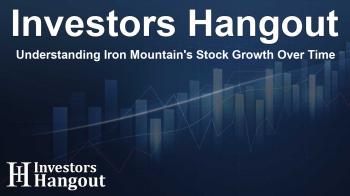Understanding Iron Mountain's Stock Growth Over Time

Understanding Iron Mountain's Stock Growth Over Time
Iron Mountain (NYSE: IRM) has displayed strong performance over the past five years, significantly beating the market. With an annualized return of 30.4%, it has consistently attracted the interest of smart investors. Presently, Iron Mountain boasts a market capitalization of $30.41 billion, a testament to its stability and growth potential.
Your $100 Investment: A Transformative Journey
Imagine if you had invested $100 in Iron Mountain stock five years ago. Well, today, that modest investment would have grown to approximately $388.20, based on a recent share price of $102.95. This remarkable increase emphasizes the benefits of long-term investing and the potential rewards of holding stocks over substantial periods.
Iron Mountain's Performance Over Last 5 Years
Over these five years, Iron Mountain has been a reliable performer in the stock market, enhancing its reputation as a solid investment choice within the storage and information management sector. This growth illustrates the importance of compounded returns, where your investment gains generate further gains, highlighting a key concept in wealth accumulation.
The Importance of Compounding in Investment
Compounded returns are essential in growing wealth effectively. Even a small initial investment can flourish over time, thanks to this powerful effect. Understanding how compounding works can radically change how individuals approach investing. When you reinvest your returns, you benefit from earning money not just on your original investment, but also on your previous gains.
Current Market Overview for Iron Mountain
As of now, Iron Mountain continues to flourish in the competitive marketplace. With its innovative approaches and strategic investments, the company is well-positioned for future growth. Investors are keenly watching its performance and market strategies as the company adapts to changing economic conditions and customer demands.
Frequently Asked Questions
1. What factors led to Iron Mountain's growth over the years?
Iron Mountain's growth can be attributed to its strategic investments, market demand for information management, and the effectiveness of its business model.
2. How does compounding benefit investors?
Compounding allows investors to earn returns on their initial investments as well as on the accumulated gains, leading to exponential growth over time.
3. Is Iron Mountain a good investment for beginners?
Iron Mountain's consistent performance in the market makes it an appealing choice for beginners seeking a mix of stability and growth potential.
4. What is the current market capitalization of Iron Mountain?
Iron Mountain currently holds a market capitalization of $30.41 billion, marking its significance in the industry.
5. How can I start investing in Iron Mountain?
To start investing in Iron Mountain, consider setting up a brokerage account and researching the company's performance before making any investments.
About The Author
Contact Addison Perry privately here. Or send an email with ATTN: Addison Perry as the subject to contact@investorshangout.com.
About Investors Hangout
Investors Hangout is a leading online stock forum for financial discussion and learning, offering a wide range of free tools and resources. It draws in traders of all levels, who exchange market knowledge, investigate trading tactics, and keep an eye on industry developments in real time. Featuring financial articles, stock message boards, quotes, charts, company profiles, and live news updates. Through cooperative learning and a wealth of informational resources, it helps users from novices creating their first portfolios to experts honing their techniques. Join Investors Hangout today: https://investorshangout.com/
The content of this article is based on factual, publicly available information and does not represent legal, financial, or investment advice. Investors Hangout does not offer financial advice, and the author is not a licensed financial advisor. Consult a qualified advisor before making any financial or investment decisions based on this article. This article should not be considered advice to purchase, sell, or hold any securities or other investments. If any of the material provided here is inaccurate, please contact us for corrections.

